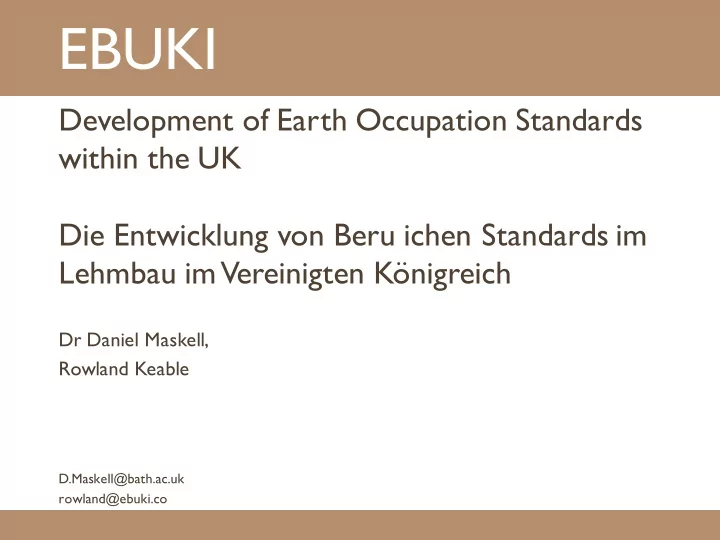

EBUKI Development of Earth Occupation Standards within the UK Die Entwicklung von Beru ichen Standards im Lehmbau imVereinigten Ko ̈ nigreich Dr Daniel Maskell, Rowland Keable D.Maskell@bath.ac.uk rowland@ebuki.co
EBUKI Introduction
EBUKI Introduction
EBUKI Introduction EBUK was formed in October 2007 Mission Statement: to inspire (alt. foster) the conservation, understanding and development of • building with earth in the United Kingdom. EBUK expanded to include Ireland in 2015 forming EBUKI Registered UK charity in 2015
EBUKI Introduction Aims: Conservation : to promote the recognition, understanding and cultural • significance of existing earth buildings in the UK and Ireland T o promote the appropriate repair and maintenance of earth buildings. New Build : to promote earth building in contemporary construction. T o work • towards the development of appropriate standards and testing methods. Knowledge : to promote research and the development of understanding of • earthen materials and their applications. Skills & Education : to foster the traditional skills base and promote the • development of new skills and techniques. T o promote earth building during the education and training of construction professionals. Networking : to represent earth building interests as an authoritative national • body, fostering links to other relevant organisations, both within the UK. and internationally. T o promote the development and dissemination of guidance on earth building. T o foster networking between members.
EBUKI Training
EBUKI Training
EBUKI Training
EBUKI Training
EBUKI Training
EBUKI Training
EBUKI Standards ASTM E2392 / E2392M - 10(2016) Standard Guide for Design of Earthen Wall Building Systems DIN 18945 (2013-08) Earth Blocks - T erms And Definitions, Requirements, T est Methods DIN 18946 (2013-08) Earth masonry mortar -T erms and definitions, requirements, test methods DIN 18947 (2013-08) Earth plasters - T erms and definitions, requirements, test methods NZS 4297 (1998): Engineering design of earth buildings
EBUKI Standards British standards institute National Occupation Standards National Vocational Qualifications Construction Industry Training Board
EBUKI Qualifications The EQF aims to relate different countries' national qualifications systems to a common European reference framework. Individuals and employers will be able to use the EQF to better understand and compare the qualifications levels of different countries and different education and training systems.
EBUKI Qualifications Level Example 1 2 UK - GCSE (16 yrs) 3 UK - GCSE (16 yrs) 4 UK - A-level (18 yrs) 5 6 Bachelor degree 7 Master’s degree 8 PhD
EBUKI Qualifications Make it easier for people to get validation and recognition of work-related skills and knowledge acquired in different systems and countries – so that they can count towards vocational qualifications Make it more attractive to move between different countries and learning environments Increase the compatibility between the different vocational education and training (VET) systems in place across Europe, and the qualifications they offer Increase the employability of VET graduates and the confidence of employers that each VET qualification requires specific skills and knowledge.
EBUKI Earth building training standards A framework for learning and teaching earth building in Europe Empower professionals, offer modular qualification, encourage employment opportunities and mobility, further skills training to help job search. Guide teachers when defining new content and assessment procedures, judging learners performance. Be a tool for certifying bodies when reviewing or creating qualifications, looking for transnational compatibility.
EBUKI Earth building training standards European co-operation in developing earth building training standards: results of the Pirate project Europ ä ische Kooperation zur Entwicklung von Standards in der Lehmbauausbildung Keable, R.; Brown, M.; Faria, P .; Costi de Castrillo, M.; Didier, L. Pirate Project, EU
EBUKI Earth building training standards Unit Description Subunit EQF Level L1 L2 L3 L4 L5 M From raw material to earth mix P Production of prefabricated elements Building with earth B1 Earth Masonry B2 Cob B B3 Rammed Earth C Application of clay plaster F Formwork for earth building Repair and conservation in earth R1 Building building R R2 Clay Plaster D Interior design O Decorative techniques E Earth building market
EBUKI Earth building training standards
EBUKI Earth building training standards Within construction Levels 3 and 4 apply to workers taking responsibility for completion of tasks and exercising self-management respectively. Levels 5 and 6 apply to supervisors managing technical activities, responsible for decision-making in unpredictable contexts. Level 7 is suitable for the design team including architects and engineers Level 8 reserved for academics.
EBUKI Expertise EBUKI
EBUKI Expertise EBUKI
EBUKI Expertise EBUKI
EBUKI Expertise EBUKI
EBUKI Standards
EBUKI Standards National Occupation Standards
EBUKI Heritage skills
EBUKI Heritage skills
EBUKI Heritage skills- Prepare and Erect
EBUKI Heritage skills
EBUKI Timeline Project commenced November 2014 Out for consultation 20/01/14 Passed to submissions team 15/06/15 24/06/15 Final submitted to regulators Final approved by regulators August 2015
EBUKI Expertise EBUKI
EBUKI Expertise EBUKI EBUK I
EBUKI June 2016
EBUKI Expertise EBUKI EBUK I
EBUKI Expertise EBUKI
EBUKI Expertise EBUKI
EBUKI Expertise EBUKI
EBUKI Summary EBUKI have successfully developed a National Vocational Qualification for new build and conservation of earthen structures Achieved through the recognition of earthen construction as a heritage skill, The NVQ is aligned to the European Qualification Framework. Allows lifelong learning and mobility of Earth builders around Europe, Resulting from the ECVET funded Pirate project.
EBUKI Expertise EBUKI
EBUKI Expertise EBUKI
EBUKI
Recommend
More recommend